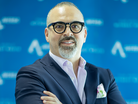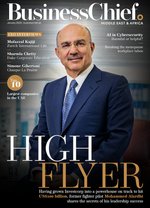COP28 Talks: Averda chief sustainability officer Samer Kamal

The countdown to COP28 is well and truly on.
Arguably the world’s most important gathering on climate change, COP28 is scheduled to take place from 30 November to 12 December 2023 in Dubai, UAE.
Among dignitaries, Pope Francis and King Charles III will be attendance, with the UK monarch expected to address world leaders at the opening ceremony on December 1.
Described by Dr Sultan Al Jaber, COP28 President-designate as the most “inclusive” COP yet, this year’s summit recognises the voice of developing countries that form the Global South – and will include indigenous people, climate advocates, startups, youth and local leaders as well as policymakers and heads of governments.
Among the issues to be tackled and resolved, the phasing out of fossil fuels and fast-tracking the energy transition is perhaps the most crucial, while fixing climate finance is also high on the agenda.
But what do regional sustainability leaders want to see on the agenda – and what are their hopes for the climate conference that is taking place on their doorstep?
In the weeks leading up to COP28, Business Chief Middle East & Africa turns to regional sustainability chiefs and strategists to find out.
First up, Samer Kamal, an impact entrepreneur and established thought leader in the environment and sustainability industry – who serves as the first-ever Chief Sustainability Officer of Averda, the leading end-to-end waste management, treatment and recycling company in the emerging world.
With 60,000 clients across EMEA and India, Averda has been keeping cities and the environment clean for 35 years – and is on a mission to treat, recover and recycle over 80% of its waste using sustainable solutions.
Dubai-based Samer, who began his career in Canada where he founded a strategy consultancy supporting the tech sector, is dedicated to the principle that businesses should place the reversal of global warming and elevation of the opportunities and lives of their stakeholders at the forefront of their business strategies to drive profitability and longevity.
In 2006, Samer identified a waste management opportunity in the UAE and founded Bee’ah, a company that has transformed waste management in the UAE and today has AED 4 billion in AUM, more than 2000 employees, and serves over a million people and educates over 100,000 students about the environment.
Among other sustainable businesses, projects and investments, Samer has operated a water recycling project in Dubai in partnership with Veolia and BESIX - changing the business model for private sewage treatment in the UAE; developed a bottle-to-bottle recycling project in Abu Dhabi in partnership with Veolia; and invested in Minus Global - a food waste technology company that is saving millions of tons of carbon while helping companies reduce the amount of food they throw away.
Most recently, Samer joined the management team at Averda to drive their transformation from traditional waste management to circular services; helping the company and its customers decarbonise for the future of the planet.
Samer, why do you think the UAE perfectly placed to host COP28?
The UAE is at the centre of the world culturally, geographically and environmentally. With the cachet of the UAE, the world is watching what happens here as a model for rapid and successful growth, including its approach to climate change.
As a leading travel hub, the UAE is well-positioned to link the global south with the global north, and likewise is a great meeting point between east and west.
From an environmental perspective, the UAE as a major oil producer with significant food and water vulnerability has to balance these two ends of the climate change discussion.
What are your hopes for this COP28?
I hope to see that we reach real consensus on cutting our addiction to fossil fuels and enforceable commitments by the global north to bear financial responsibility for the uneven climate burden being shouldered by the global south.
It is vitally important that this COP serves as proof that COP still has relevance and merit. There is a risk after so many years of debate with limited actions and even more limited outcomes that COP could become irrelevant.
The challenge facing COP this year is an existential one in my opinion.
What do you consider the main climate change challenges for the corporate sector regionally?
The private sector faces two key challenges in relation to climate change.
The first is one of priority and relevance. With the rapid growth of regional economies, many businesses find themselves occupied with managing growth at the expense of the environment in this frontier economy.
The second challenge is that companies seeking to support climate change mitigation are still doing so in a regulatory environment that is not as mature as their aspirations.
Regional governments are moving quickly to address this gap in regulations but nonetheless companies must lead rather than follow regulations in climate action in most cases.
Featured Articles
SAP has announced it has appointed a new President for a newly-created EMEA region, aiming to make the most of the opportunities of cloud and AI
technology
From fighter pilot to fashion house financier, Mohammed Alardhi has taken Investcorp to great heights – so what’s the secret to his success?
Dr Omar Al-Attas, Head of Environmental Protection and Regeneration at Red Sea Global, shares his COP28 hopes and approach to regenerative tourism
strategy


